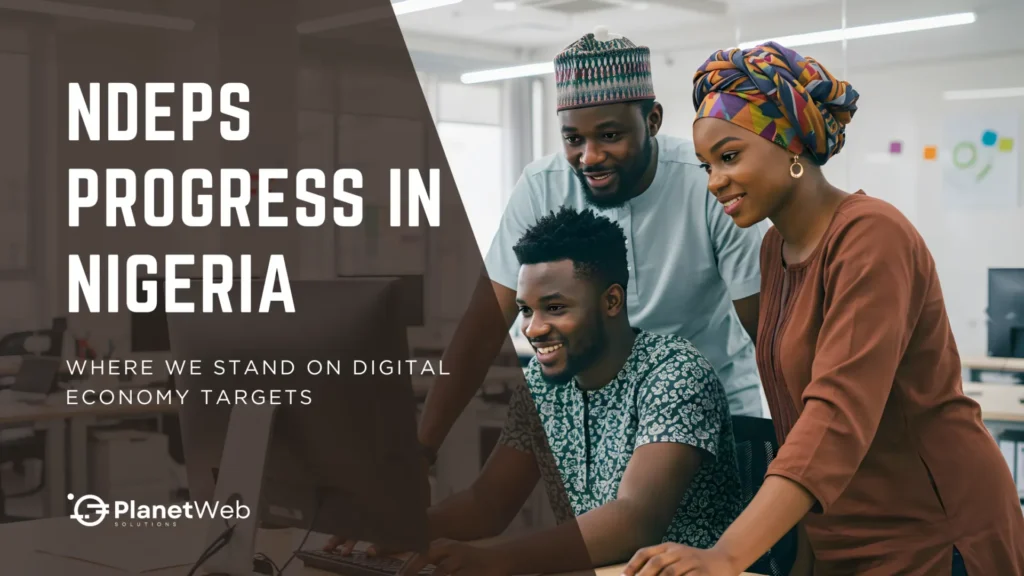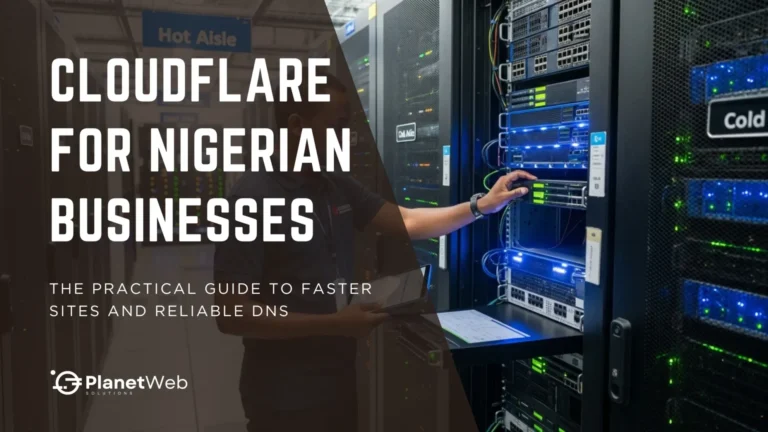NDEPS Progress in Nigeria: What We Achieved vs. What We Promised
In 2019, Nigeria launched the National Digital Economy Policy and Strategy (NDEPS) with ambitious targets: 70% broadband penetration by 2025, 5 million Nigerians trained in digital skills, and fully digitized government services.
We’re now in 2025. So, where do we actually stand?
This is a comprehensive look at NDEPS progress in Nigeria based on measurable outcomes, real data, and honest assessment of what’s working and what’s falling short.
If you want to understand what NDEPS pillars are and why they matter, we’ve covered that separately. This article answers a simpler question: Are we hitting our targets?
The NDEPS Targets: What We Promised in 2019
Before we assess progress, here’s what Nigeria committed to achieving by 2025:
Broadband & Infrastructure:
- 70% broadband penetration nationwide
- Minimum 25 Mbps download speeds in urban areas
- Minimum 10 Mbps in rural areas
Skills & Capacity:
- Train 5 million Nigerians in digital skills
- Establish digital innovation hubs in all 36 states
Digital Government:
- 100% of government services are available digitally
- Unified digital identity system (NIN integration)
Startup Ecosystem:
- Legislative framework supporting tech startups
- Dedicated funding mechanisms for innovation
Emerging Tech:
- AI and blockchain integration across sectors
- Local content development in technology
Let’s see how we’ve done on each front.
Progress Report: Where Nigeria’s Digital Economy Stands in 2025
Broadband & Infrastructure: Behind Target
Target: 70% penetration by 2025
Current Status: Approximately 51-53% as of Q4 2024 (NCC data)
What’s Working:
- The 2Africa submarine cable landed in Lagos in 2024, dramatically increasing international bandwidth capacity.
- Infraco’s fiber rollout has extended backbone infrastructure to previously underserved states.
- 5G deployment in Lagos, Abuja, Port Harcourt, and 9 other cities by MTN and Airtel.
What’s Not Working:
- Rural broadband remains severely limited. States like Taraba, Yobe, and Zamfara have a penetration rate below 20%.
- Right-of-Way (RoW) fees vary wildly by state, making infrastructure deployment unpredictable and expensive.
- Last-mile connectivity lags far behind backbone infrastructure. Having fiber in a state doesn’t mean citizens can access it.
The Gap: We’re roughly 17-19 percentage points short of the 70% target. At current growth rates, Nigeria won’t hit 70% until 2027-2028.
Verdict: Significant progress, but target missed. Infrastructure exists, but access doesn’t match availability.
Digital Skills: Progress, But Incomplete Data
Target: Train 5 million Nigerians in digital skills
Current Status: Unclear. No centralized tracking system exists.
What’s Working:
- Data Science Nigeria received ₦2.8 billion in funding and has trained thousands in AI and data science.
- The Google-backed AI Fund and Microsoft’s 4Afrika initiative are building capacity.
- Programs like iHatch by NITDA are running across multiple states.
What’s Not Working:
- No unified dashboard tracking how many Nigerians have actually been trained.
- Most programs are concentrated in Lagos, Abuja, and Port Harcourt. Other states lag significantly.
- Training quality varies widely. A 2-day workshop counts the same as a 6-month intensive program in current metrics.
The Gap: We can’t accurately measure progress without centralized data. Anecdotal evidence suggests hundreds of thousands trained, but nowhere near 5 million.
Verdict: Good initiatives, poor tracking. We’re probably at 20-30% of the target, but we don’t actually know.
Digital Government Services: Slow Rollout
Target: 100% of government services available digitally
Current Status: Estimated 25-35% digitization at the federal level, much lower at the state and local levels.
What’s Working:
- Services.gov.ng provides access to passport renewal, visa applications, and tax services online.
- NIN enrollment has reached over 100 million Nigerians.
- Some states, like Lagos and Kaduna, have digitized land registry and tax payment systems.
What’s Not Working:
- Most local government areas lack digital service infrastructure entirely.
- Many “digital” services still require in-person verification or document submission, defeating the purpose.
- Integration between agencies remains poor. Your NIN doesn’t automatically work across all government platforms.
The Gap: Federal services are partially digitized. State services vary wildly. Local government services remain almost entirely manual, limiting Nigeria’s digital economy growth at the grassroots level.
Verdict: Progress at the top, stagnation at the bottom. Digital transformation in Nigeria is happening unevenly across government levels.
Startup Ecosystem: Legislative Win, Funding Challenge
Target: Supportive legislative framework and funding mechanisms
Current Status: Mixed results.
What’s Working:
- The Nigeria Startup Act was passed in 2022, providing a legal framework for startup support, tax incentives, and regulatory clarity.
- Moniepoint became Nigeria’s latest unicorn in 2024, joining Interswitch, Flutterwave, OPay, and Andela.
- Emerging tech hubs in Abuja, Enugu, and Ibadan are slightly reducing Lagos’ dominance.
What’s Not Working:
- Only 10-12 states have domesticated the Startup Act as of early 2025. Implementation remains concentrated in a few states.
- Venture funding dropped significantly in 2023-2024. Many startups struggled or shut down (Thepeer, BuyCoins Pro).
- Over 80% of VC activity still concentrates in Lagos. Regional startups struggle to access capital.
The Gap: Policy framework exists, but implementation is uneven. The funding environment has tightened significantly.
Verdict: Legislative target achieved. Funding and nationwide implementation lag behind, creating an uneven Nigerian digital economy landscape where Lagos thrives while other regions struggle. The future of IT solutions in Nigeria depends on broader access to capital and support.
Cybersecurity & Data Protection: Framework in Place, Enforcement Weak
Target: Robust cybersecurity framework and data protection compliance
Current Status: Regulations exist, but enforcement is inconsistent.
What’s Working:
- Nigeria Data Protection Act 2023 replaced NDPR, giving NDPC stronger enforcement powers.
- Major companies (banks, telcos, tech firms) are largely compliant with data protection requirements.
- NIN-SIM linkage increased identity verification and reduced fraud in telecom.
What’s Not Working:
- Nigeria hasn’t joined the Budapest Convention on cybercrime, limiting international cooperation on cyber threats.
- Many SMEs remain non-compliant with NDPA requirements, often due to a lack of awareness.
- Data breaches still occur regularly, with limited public disclosure or accountability.
The Gap: Good regulatory framework, weak enforcement mechanisms.
Verdict: Strong on paper, inconsistent in practice. Data protection compliance is improving, but it is still optional for many smaller businesses.
Emerging Technologies: Real Progress, Limited Scale
Target: AI, blockchain, and emerging tech integration across sectors
Current Status: Promising pilots, limited production deployments.
What’s Working:
- AI startups like FundusAI (healthcare), Farmspeak (agriculture), and Rana Energy are solving real Nigerian problems.
- Blockchain applications in remittances show genuine adoption (Nigeria ranks top 10 globally in crypto usage).
- Green tech initiatives like solar mini-grids are expanding energy access.
What’s Not Working:
- Most emerging tech remains in the pilot phase. Few solutions have reached scale.
- Regulatory uncertainty (especially around crypto) limits investment and growth.
- Infrastructure constraints make advanced tech deployment difficult outside major cities.
The Gap: Innovation exists, but scale remains elusive.
Verdict: Nigeria has the talent and innovation. Infrastructure and regulatory clarity will determine whether these solutions reach the mass market.
Local Content & Innovation: Inconsistent Implementation
Target: Prioritize Nigerian tech solutions in government procurement
Current Status: Policy exists, enforcement varies.
What’s Working:
- Executive Orders 003 and 005 (issued under the Buhari administration) directed federal agencies to prioritize local content.
- Some states, like Enugu, have implemented smart school programs and digital training hubs using local solutions.
- Nigerian software companies are winning more government contracts than in previous years.
What’s Not Working:
- Many government agencies still default to international vendors for major technology projects.
- No clear mechanism to verify or enforce local content requirements.
- “Local content” definitions remain vague, allowing loopholes.
The Gap: Good policy intent, weak enforcement mechanisms.
Verdict: Progress exists, but implementation is inconsistent across agencies and levels of government.
NDEPS Progress in Nigeria: The Overall Scorecard
Here’s the honest assessment of how each pillar has performed against NDEPS targets:
| Pillar | Target Achievement | Status |
|---|---|---|
| Broadband Infrastructure | ~51-53% vs 70% target | 🔴 Behind |
| Digital Skills | Unknown (likely 20-30% of 5M) | 🟡 Incomplete Data |
| Digital Government | ~25-35% digitization | 🔴 Behind |
| Startup Ecosystem | Framework ✓, Funding ✗ | 🟡 Mixed |
| Cybersecurity/Data | Framework ✓, Enforcement ✗ | 🟡 Mixed |
| Emerging Tech | Innovation ✓, Scale ✗ | 🟡 Mixed |
| Local Content | Policy ✓, Enforcement ✗ | 🟡 Mixed |
Overall Assessment: NDEPS progress in Nigeria shows real advancement on policy frameworks and innovation, but implementation, infrastructure, and enforcement lag significantly behind targets.
We’re not failing, but we’re not succeeding at the pace NDEPS envisioned.
Why Nigeria’s Digital Economy Progress Is Slower Than Expected
Several factors explain why Nigeria’s digital economy hasn’t hit NDEPS targets:
Infrastructure Economics: Broadband deployment costs remain high due to inconsistent RoW fees, security challenges in some states, and dispersed rural populations, making last-mile connectivity economically challenging.
Coordination Gaps: Federal policies don’t automatically translate to state and local implementation. Many states lack the capacity or political will to execute NDEPS initiatives.
Funding Constraints: Both government budget limitations and the global tech funding downturn in 2023-2024 have significantly slowed progress.
Regulatory Uncertainty: Changing policies (especially around fintech and crypto) create hesitation among investors and entrepreneurs.
Implementation Over Innovation: Nigeria excels at creating policies and launching initiatives. Sustained implementation and follow-through remain weak, slowing Nigeria’s digital economy transformation.
What Needs to Happen Next for Nigeria’s Digital Economy
To get Nigeria’s digital economy back on track with NDEPS targets, the country needs:
Aggressive Infrastructure Push:
- Standardize RoW fees nationwide to reduce deployment costs
- Fast-track last-mile connectivity projects in rural areas
- Provide subsidies or tax incentives for ISPs expanding to underserved regions
Better Measurement:
- Create unified dashboards tracking skills training, digitization progress, and broadband penetration in real-time
- Publish quarterly progress reports with actual data, not aspirational claims
State-Level Enforcement:
- Get all 36 states to domesticate the Startup Act
- Require states to report digital economy progress as a condition for federal tech funding
- Establish minimum digitization standards for local governments
Regulatory Clarity:
- Clarify crypto/blockchain regulations to unlock investment
- Streamline compliance for startups while maintaining security standards
- Join international cybersecurity frameworks like the Budapest Convention
Focus on Implementation:
- Move beyond launching programs to ensuring they actually execute and deliver results
- Hold agencies accountable for NDEPS targets with real consequences for non-performance
The Path Forward: Accelerating NDEPS Progress in Nigeria
Five years into NDEPS, Nigeria has built foundations but hasn’t reached the ambitious targets set in 2019.
The infrastructure is expanding, but not fast enough. The policies exist, but enforcement is weak. The innovation is real, but scale remains elusive.
This isn’t failure. It’s an incomplete success.
Nigeria’s digital economy is growing, but not at the pace needed to be globally competitive. The question isn’t whether we’re making progress. It’s whether we’re making progress fast enough to matter.
If Nigeria can accelerate infrastructure deployment, strengthen policy enforcement, and focus on implementation over announcements, we can still become the digital leader in Africa that NDEPS envisioned.
But that requires moving from strategy documents to measurable action. Now.
Frequently Asked Questions
Related Reading
- NDEPS Pillars in Nigeria: What They Mean for You and Your Business
- Digital Transformation in Nigeria: What’s Working and What’s Not
- The Future of IT Solutions in Nigeria
- Navigating the Nigeria Data Protection Act 2023
Stay Informed on NDEPS Progress in Nigeria
At PlanetWeb, we track Nigeria’s digital transformation journey and provide honest analysis of NDEPS progress in Nigeria, tech policy changes, and what they mean for businesses and startups.
✔ Share this report with anyone tracking Nigeria’s digital economy
✔ Subscribe to our newsletter for ongoing NDEPS progress updates
✔ Follow us on LinkedIn or X
What progress have you seen in Nigeria’s digital economy? Share your observations in the comments.






